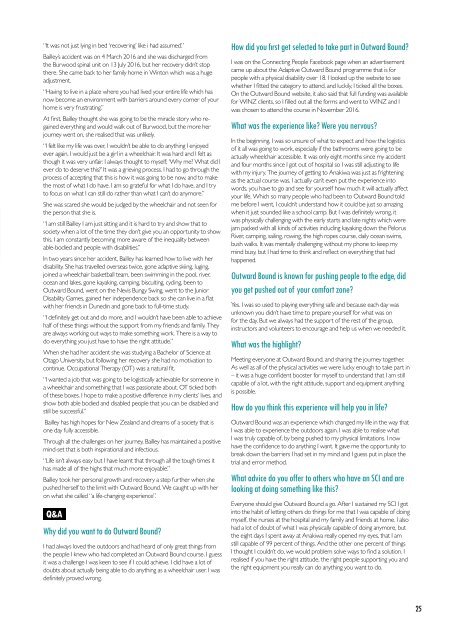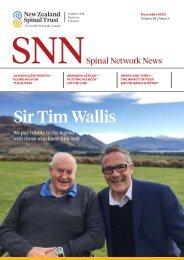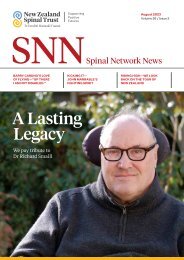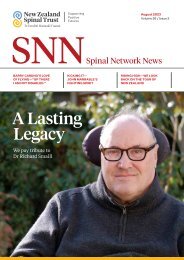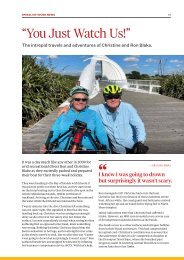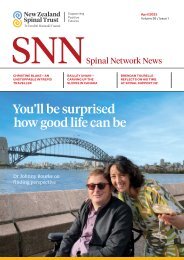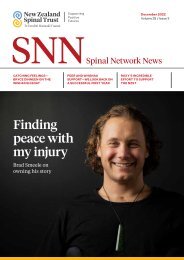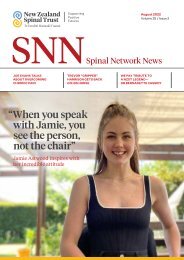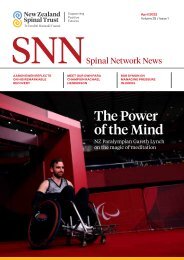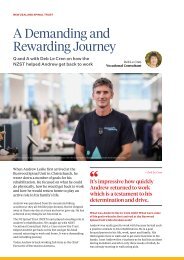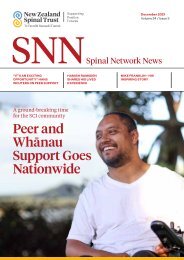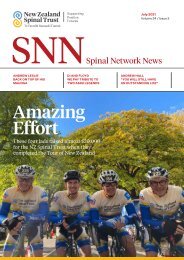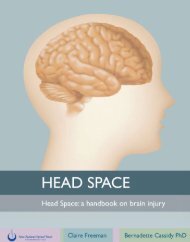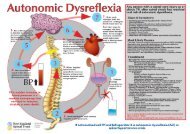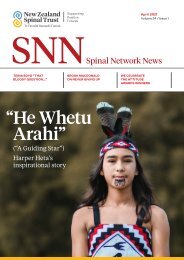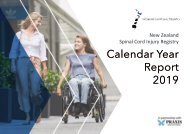SNN July 2018
A.J. Poua personal trainer in a wheelchair Attitude employee award BNZ Crusaders visit NZSCIR registry Welcome backpack Wheelie Good Tips Bayfair Festival of Disability Sports Bailey Unahi Outward Bound Jazz on fitness Lynda Scott 49 yrs in a chair
A.J. Poua personal trainer in a wheelchair
Attitude employee award
BNZ Crusaders visit
NZSCIR registry
Welcome backpack
Wheelie Good Tips
Bayfair Festival of Disability Sports
Bailey Unahi Outward Bound
Jazz on fitness
Lynda Scott 49 yrs in a chair
You also want an ePaper? Increase the reach of your titles
YUMPU automatically turns print PDFs into web optimized ePapers that Google loves.
“It was not just lying in bed ‘recovering’ like i had assumed.”<br />
Bailley’s accident was on 4 March 2016 and she was discharged from<br />
the Burwood spinal unit on 13 <strong>July</strong> 2016, but her recovery didn’t stop<br />
there. She came back to her family home in Winton which was a huge<br />
adjustment.<br />
“Having to live in a place where you had lived your entire life which has<br />
now become an environment with barriers around every corner of your<br />
home is very frustrating.”<br />
At first, Bailley thought she was going to be the miracle story who regained<br />
everything and would walk out of Burwood, but the more her<br />
journey went on, she realised that was unlikely.<br />
“I felt like my life was over, I wouldn’t be able to do anything I enjoyed<br />
ever again, I would just be a girl in a wheelchair. It was hard and I felt as<br />
though it was very unfair. I always thought to myself; ‘Why me? What did I<br />
ever do to deserve this?’ It was a grieving process. I had to go through the<br />
process of accepting that this is how it was going to be now, and to make<br />
the most of what I do have. I am so grateful for what I do have, and I try<br />
to focus on what I can still do rather than what I can’t do anymore.”<br />
She was scared she would be judged by the wheelchair and not seen for<br />
the person that she is.<br />
“I am still Bailley I am just sitting and it is hard to try and show that to<br />
society when a lot of the time they don’t give you an opportunity to show<br />
this. I am constantly becoming more aware of the inequality between<br />
able-bodied and people with disabilities.”<br />
In two years since her accident, Bailley has learned how to live with her<br />
disability. She has travelled overseas twice, gone adaptive skiing, luging,<br />
joined a wheelchair basketball team, been swimming in the pool, river,<br />
ocean and lakes, gone kayaking, camping, biscuiting, cycling, been to<br />
Outward Bound, went on the Nevis Bungy Swing, went to the Junior<br />
Disability Games, gained her independence back so she can live in a flat<br />
with her friends in Dunedin and gone back to full-time study.<br />
“I definitely get out and do more, and I wouldn’t have been able to achieve<br />
half of these things without the support from my friends and family. They<br />
are always working out ways to make something work. There is a way to<br />
do everything you just have to have the right attitude.”<br />
When she had her accident she was studying a Bachelor of Science at<br />
Otago University, but following her recovery she had no motivation to<br />
continue. Occupational Therapy (OT) was a natural fit.<br />
“I wanted a job that was going to be logistically achievable for someone in<br />
a wheelchair and something that I was passionate about. OT ticked both<br />
of these boxes. I hope to make a positive difference in my clients’ lives, and<br />
show both able bodied and disabled people that you can be disabled and<br />
still be successful.”<br />
Bailley has high hopes for New Zealand and dreams of a society that is<br />
one day fully accessible.<br />
Through all the challenges on her journey, Bailley has maintained a positive<br />
mind-set that is both inspirational and infectious.<br />
“Life isn’t always easy but I have learnt that through all the tough times it<br />
has made all of the highs that much more enjoyable.”<br />
Bailley took her personal growth and recovery a step further when she<br />
pushed herself to the limit with Outward Bound. We caught up with her<br />
on what she called “a life-changing experience”.<br />
Q&A<br />
Why did you want to do Outward Bound?<br />
I had always loved the outdoors and had heard of only great things from<br />
the people I knew who had completed an Outward Bound course. I guess<br />
it was a challenge I was keen to see if I could achieve. I did have a lot of<br />
doubts about actually being able to do anything as a wheelchair user. I was<br />
definitely proved wrong.<br />
How did you first get selected to take part in Outward Bound?<br />
I was on the Connecting People Facebook page when an advertisement<br />
came up about the Adaptive Outward Bound programme that is for<br />
people with a physical disability over 18. I looked up the website to see<br />
whether I fitted the category to attend, and luckily, I ticked all the boxes.<br />
On the Outward Bound website, it also said that full funding was available<br />
for WINZ clients, so I filled out all the forms and went to WINZ and I<br />
was chosen to attend the course in November 2016.<br />
What was the experience like? Were you nervous?<br />
In the beginning, I was so unsure of what to expect and how the logistics<br />
of it all was going to work, especially if the bathrooms were going to be<br />
actually wheelchair accessible. It was only eight months since my accident<br />
and four months since I got out of hospital so I was still adjusting to life<br />
with my injury. The journey of getting to Anakiwa was just as frightening<br />
as the actual course was. I actually can’t even put the experience into<br />
words, you have to go and see for yourself how much it will actually affect<br />
your life. Which so many people who had been to Outward Bound told<br />
me before I went, I couldn’t understand how it could be just so amazing<br />
when it just sounded like a school camp. But I was definitely wrong, it<br />
was physically challenging with the early starts and late nights which were<br />
jam packed with all kinds of activities including kayaking down the Pelorus<br />
River, camping, sailing, rowing, the high ropes course, daily ocean swims,<br />
bush walks. It was mentally challenging without my phone to keep my<br />
mind busy, but I had time to think and reflect on everything that had<br />
happened.<br />
Outward Bound is known for pushing people to the edge, did<br />
you get pushed out of your comfort zone?<br />
Yes. I was so used to playing everything safe and because each day was<br />
unknown you didn’t have time to prepare yourself for what was on<br />
for the day. But we always had the support of the rest of the group,<br />
instructors and volunteers to encourage and help us when we needed it.<br />
What was the highlight?<br />
Meeting everyone at Outward Bound, and sharing the journey together.<br />
As well as all of the physical activities we were lucky enough to take part in<br />
– it was a huge confident booster for myself to understand that I am still<br />
capable of a lot, with the right attitude, support and equipment anything<br />
is possible.<br />
How do you think this experience will help you in life?<br />
Outward Bound was an experience which changed my life in the way that<br />
I was able to experience the outdoors again. I was able to realise what<br />
I was truly capable of, by being pushed to my physical limitations. I now<br />
have the confidence to do anything I want. It gave me the opportunity to<br />
break down the barriers I had set in my mind and I guess put in place the<br />
trial and error method.<br />
What advice do you offer to others who have an SCI and are<br />
looking at doing something like this?<br />
Everyone should give Outward Bound a go. After I sustained my SCI I got<br />
into the habit of letting others do things for me that I was capable of doing<br />
myself, the nurses at the hospital and my family and friends at home. I also<br />
had a lot of doubt of what I was physically capable of doing anymore, but<br />
the eight days I spent away at Anakiwa really opened my eyes, that I am<br />
still capable of 99 percent of things. And the other one percent of things<br />
I thought I couldn’t do, we would problem solve ways to find a solution. I<br />
realised if you have the right attitude, the right people supporting you and<br />
the right equipment you really can do anything you want to do.<br />
25


